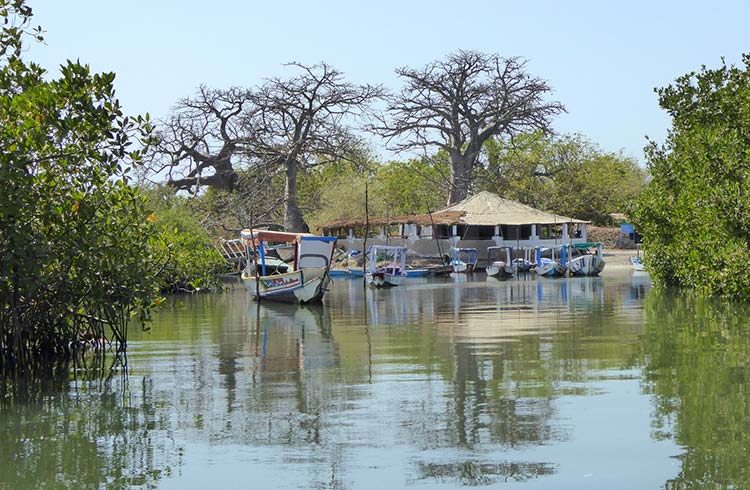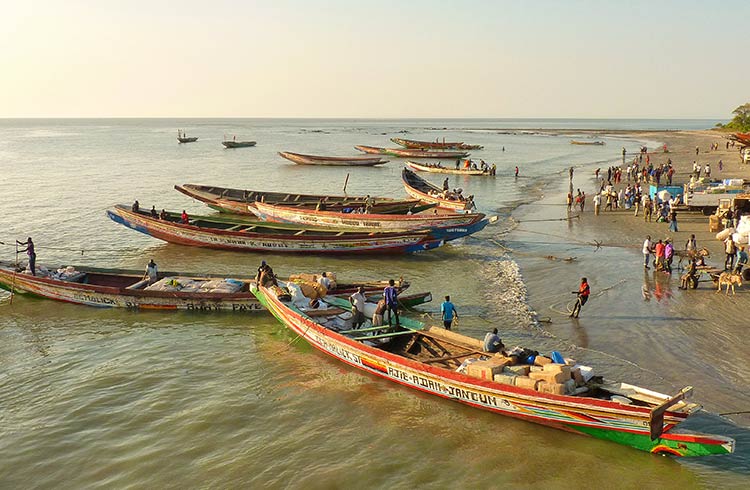Travel Health Tips and Transport Safety in The Gambia
Coronavirus (COVID-19) and travel: The situation around the world is changing dramatically. Various governments have changed their travel warnings to restrict travel during this time. To understand how this may impact cover under your policy, please go to our FAQs and select your country of residence.
For the latest travel warnings and alerts around the world, read about lockdowns and border restrictions.
Find out what vaccinations you may need to get before you go to The Gambia, plus tips on staying healthy and getting around the country safely.
 Photo © Getty Images/Frans Sellies
Photo © Getty Images/Frans Sellies
Vaccinations required for travelers to The Gambia
The Gambia's sanitation is poor, and mosquito borne diseases are prevalent. A yellow fever vaccination certificate is required from travelers coming from areas with risk of yellow fever transmission. This is particularly relevant for those traveling to The Gambia from neighboring African countries. Water borne diseases and malaria are common in The Gambia throughout the year You should take precautions to avoid insect bites such as wearing insect repellent at all times and sleeping under mosquito nets.
The risk of malaria is greater during the months of June to November.
It is not safe to drink the water, so you should boil all drinking water (for at least one minute) or pack water purification tablets. Avoid ice cubes, or eating raw and undercooked food.
You should consider the following vaccinations before traveling to The Gambia, but see your travel doctor to get the best advice for you:
- Hepatitis A and B
- Rabies
- Polio
- Pneumonia
- Shingles
- Influenza
- Typhoid
- Meningococcus
- Booster shots for measles, mumps and rubella and tetanus-diptheria
Getting around safely in The Gambia
The Gambia is a long narrow country that follows the shape of the meandering Gambia River.
One of the major challenges faced by travelers is getting around the country by road and crossing the river safely by boat.
Most roads throughout the country are in poor condition (which only gets worse in the wet season), Gambian drivers have varying levels of skill and respect for basic road rules and the public transport system is non existent.
Be aware of the following transport safety issues to mitigate the risks:
- Many drivers do not use vehicle lights at night, particularly in areas that actually have street lights (mainly in the Banjul area)
- Drink driving is common
- Traffic laws and regulations are inconsistently applied by police, on the spot fines are common for real or contrived traffic violations
- High speed Government convoys which often take up both lanes of traffic – if you see flashing lights pull to the side of the road and let the convoy pass.
While there is no public transport system in The Gambia, there is a system of taxi cabs. There are two types of cabs: green ones (tourist cabs) and yellow ones (regular cabs). Green cabs are expensive and the price is regardless of the number of passengers. However, these taxis must have basics such as seat belts and working indicators.
Yellow taxis are much cheaper and the price depends on the number of persons in the cab, they also have lower safety standards. Yellow taxis are used mainly by locals, and in many tourist areas they are prohibited from picking up tourists, but if you walk a little further down the road you may be able to flag a yellow taxi, if you are up for the associated risks.
Hitchhiking is common, but don't use your thumb as it is considered an obscene gesture in Gambia, instead wave if you want a car to stop. As anywhere, hitching is quite risky business, so be careful with what cars you enter and never hitch at night. Also, Gambian motorists will expect you to pay for the ride, so have some cash ready. You are probably better off flagging a taxi.
You will probably find you need to cross the river at various junctures, so you need to be aware of the risks. Ferries rarely keep to their posted schedules, they are often overcrowded and they usually lack sufficient numbers of life jackets for all passengers.
You may also be tempted to flag a wooden dugout or "pirogues", again these are often overloaded, not all that safe and have been known to sink in the middle of the river.
If you want to cross the Gambia River use the Gambia Port Authority's Banjul-Barra or Yelitenda-Farafenni ferries, which are slower but safer than the privately operated pirogues.
Finally, you should not travel by road from the Gambia to the Casamance in southern Senegal as the region remains affected by banditry involving separatist groups. .
Local tours
Like many tourist attractions made more famous by being written about in best sellers, the slaving colony of St James Island is now a hotspot for petty thieves and opportunistic locals selling dodgy souvenirs or asking for money to appear in photos. Alex Haley's book, Roots, inspires many to take the cruise to St James Island, only to be confronted by the overwhelming number of locals who swarm the boat on arrival.
The Republic of Gambia, Gambia, The Smiling Coast of Africa – whatever you choose to call it, The Gambia is a relatively safe and easy country to travel to and around, even if it refers to itself in the third person.
Get a travel insurance quote for Gambia
You can buy at home or while traveling, and claim online from anywhere in the world. With 150+ adventure activities covered and 24/7 emergency assistance.
Related articles
Simple and flexible travel insurance
You can buy at home or while traveling, and claim online from anywhere in the world. With 150+ adventure activities covered and 24/7 emergency assistance.
Get a quote
No Comments